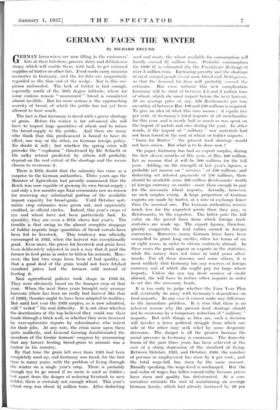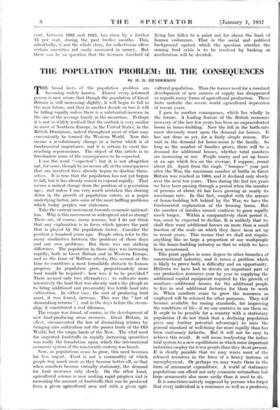GERMANY FACES THE WINTER
By RICHARD FREUND
GERMAN housewives are now filling in the customers' lists at their butchers, grocers, dairy and delikatessen shops, which will enable them, with luck, to get rationed supplies of butter or other fats. Food cards carry ominous memories in Germany, and the fat-lists are suspiciously regarded as the thin end of the wedge. Nor is this sus- picion unfounded. The lack of butter is bad enough, especially north of the 50th degree latitude, where for some curious reason " unsmeared " bread is considered almost inedible. But far more serious is the approaching scarcity of bread, of which the public has not yet been allowed to hear much.
The fact is that Germany is faced with a grave shortage of grain. Before the winter is far advanced she will have to import huge quantities of wheat and to ration the .bread-supply to the public. And there are many who think that this predicament is bound to have its effect, one way or the other, on German foreign policy. No doubt it will ; but whether the spring crisis will provoke the " explosion " threatened by Dr. Schacht or the sulky retreat predicted by others will probably depend on the real extent of the shortage and the means chosen to overcome it.
There is little doubt that the calamity has come as a surprise to the German authorities. Three years ago the Minister of Agriculture had proudly announced that the Reich was now capable of growing its own bread-supply ; and only a few months ago Nazi economists saw no reason for reserving any substantial portion of the available import capacity for bread-grain. Until October opti- mistic crop estimates were given out, and apparently credited, in official circles. Indeed, this year's crops of rye and wheat have not been particularly bad. In quantity, they are even a little above last year's. The trouble is that owing to the almost complete stoppage of fodder imports large quantities of bread cereals have been fed to livestock. This tendency was officially encouraged in 1938, when the harvest was exceptionally good. Ever since, the prices for livestock and grain have been deliberately adjusted in such a way that it paid the farmer to feed grain in order to fatten his animals. More- over, the last two crops have been of bad quality, so that a good deal of the grain would not have fetched standard prices had the farmers sold instead of feeding it.
Nazi agricultural policies took shape in 1938-84. They were obviously based on the bumper crop of that year. When the next three years brought only average harvests (there has been no really bad harvest like that of 1926), theories ought to have been adapted to realities. But until last year the 1933 surplus, as is now admitted, still " veiled " the real difficulty. It is not clear whether the doctrinaires at the top believed they could run their heads through a brick wall, or whether they were deceived by over-optimistic reports by subordinates who feared for their jobs. At any rate, the crisis came upon them quite suddenly, and General Goering dumbfounded the members of the Goslar farmers' congress by announcing that any farmer feeding bread-grain to animals was a traitor to his country.
By that time the grain left over from 1935 had been completely used up, and Germany was faced, for the first time in many years, with the problem of living through the winter on a single year's crop. There is probably enough rye to go round if no more is used as fodder ; but apart from the danger of reducing livestock to save fodder, there is certainly not enough wheat. This year's wheat crop was about 44 million tons. After deducting seed and waste, the wheat available for consumption will hardly exceed 31 million tons. Probable consumption for 1936-37 is estimated (by the Frank/it/ler Zeitung) at over 5 million toms. Increasing poverty and the shortage of meat compel people to eat more bread and ilehtspeisen, so that the demand for flour will probably exceed the estimate. But even without - this new complication Germany will be short of between 1.5 and 2 million tons of wheat, which she must import before the next harvest. At an average price of, say, 120 Reichsmarks per ton, an outlay of between Rm. 180 and 240 millions is required. To give an idea of what this sum means : it equals live per cent, of Germany's total imports of all merchandise for this year, and is nearly half as much as was spent on the import of metals and ores during the year. In other words, if the import of " military " raw materials had not been forced at the cost of wheat or fodder imports- " Guns for Butter "—the present food shortage would not have arisen. But what is to be done now ?
. On paper, Germany has had an export surplus, during the first eleven months of this year, of Rm. 460 million. Let us assume that it will be 500 millions for the full year. Adding, on the strength of last year's figures, a probable net income on " services " of 450 millions, and deducting net interest payments of 550 millions, there should be available some 400 million Reichsmarks' worth of foreign currency or credits—more than enough to pay for the necessary wheat imports. Actually, however, no such surplus exists. A large proportion of German exports are made by barter, at a rate of exchange lower than the nominal one. The German authorities receive much less for the exported goods than they pay, in Reichsmarks, to the exporter. The latter puts the full value on the postal form from which foreign trade statistics are made up. The export figures, therefore, greatly exaggerate the real values earned in foreign currencies. Moreover, many German firms have been compelled to grant long credits, often for terms of six or eight years, in order to obtain contracts abroad. In these cases the goods appear as exports in the statistics, while the money does not come in until years after- wards. For all these reasons, and some others, it is most unlikely that Germany has any reserves of foreign currency out of which she might pay for large wheat imports. Unless she can tap fresh sources of credit abroad, she will have to reduce other imports in order to set free the necessary funds.
It is too early to judge whether the Four Year Plan will eventually do away with Germany's dependence on food imports. In any ease it cannot make any difference to the immediate problem. It is true that there is no inherent reason why the present food shortage should not be overcome by a temporary reduction of " military " imports. But with things as they are, such a decision will involve a fierce political struggle from which one side or the other may seek relief by some desperate diversion. The danger is all the greater because the social pressure in Germany is enormous. The domestic boom of the past three years has been achieved at the cost of a sharp depression of the standard of living.
Between October, 1985, and October, 1986, the number of persons in employment has risen by 8 per cent., and the total wage-bill has risen by the same amount.
Broadly speaking, the wage-level is unchanged. But the real value of wages has fallen considerably because prices have risen and quality has deteriorated. At a con- servative estimate the cost of maintaining an average German family, which had already increased by 20 per cent, between 1932 and 1935, has risen by a further 15 per cent. during the past twelve months. This, admittedly, is not the whole story, for collectivism offers certain amenities not easily measured in money. But there can be no question that the German standard of living has fallen to a point not far above the limit of human endurance. That is the social and political background against which the question whether the coming food crisis is to be resolved by braking or acceleration will be .decided.







































 Previous page
Previous page